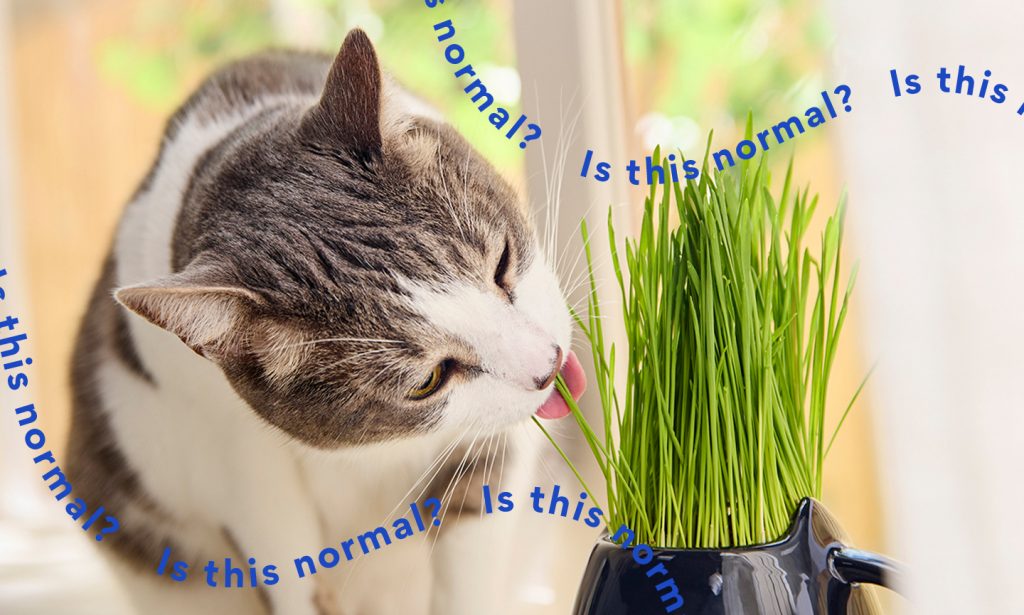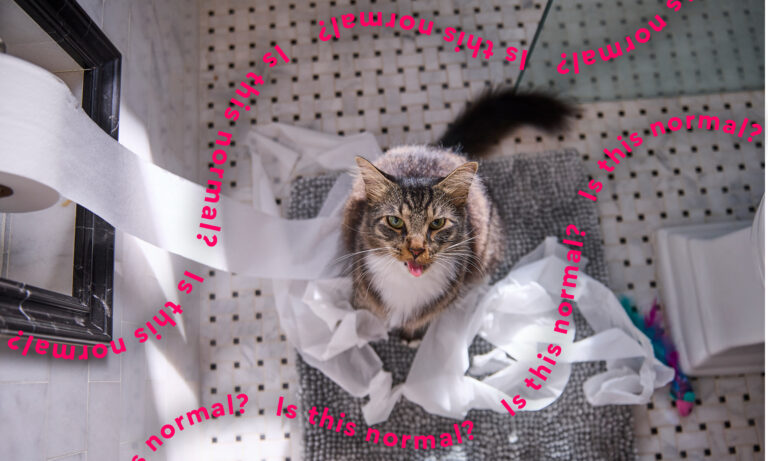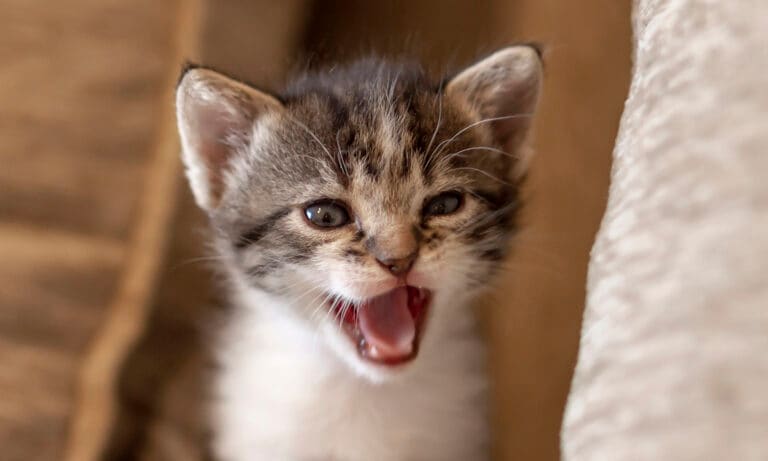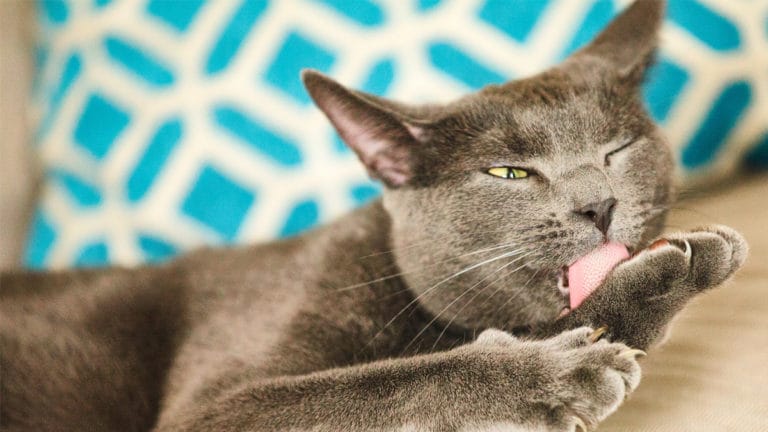Q:Is it normal that my cats eat grass? I’ve seen them nibble on the blades of grass in my yard, but I’ve heard that cats eat grass to make themselves throw up. Should I be concerned?
A: Pet parents shouldn’t be too concerned if their cat is munching on grass, since this is usually a normal—and even healthy—feline behavior. But there are some circumstances you’ll want to out watch for, like if the grass has been treated with chemicals.
Why Do Cats Eat Grass?
Experts aren’t exactly sure why cats eat grass, but there are a few theories why your furry friend might be going to town on your lawn, according to Amanda Kennedy, DVM, DABVP, a feline veterinarian at Just Cats Veterinary Clinic in Guilderland, New York.
It’s part of their genetic code.
Eating grass is “a natural behavior seen in outdoor free-roaming and feral cats, as well as wild cats like lynx, pumas and leopards,” Dr. Kennedy says, so your cat is likely just taking a walk on the wild side and tapping into their primal instincts.
It helps their tummy feel better.
If a cat is nauseous or has eaten something they’re having trouble digesting, they may eat grass to induce vomiting, Dr. Kennedy says.
Grass also can help your cat’s digestive system by expelling hairballs and, because it’s high in prebiotic-rich fiber, it acts as a mild laxative, she adds.
The bottom line? Grass can help your kitty’s digestive tract by easing constipation, curbing nausea and more.
It helps expel parasites in the GI tract.
Eating grass can actually help rid the gastrointestinal tract of parasites, Dr. Kennedy says. This is because grass contains plenty of prebiotic-rich fiber, which may improve bowel movements (remember, it acts as a natural laxative) and help purge the body of waste and intestinal parasites, she explains.
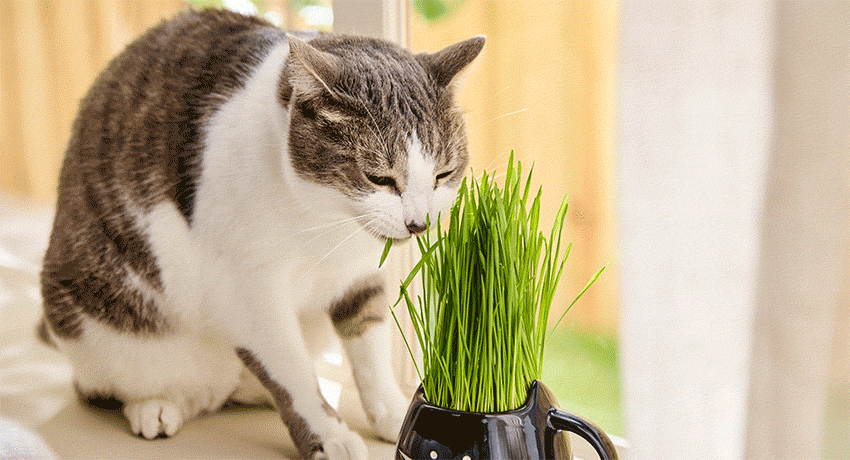
OK, so cats probably don’t know they have intestinal parasites and this is why they are eating grass. But they probably feel indigestion, nausea or bloating as a result of the parasites, and “they must also understand that by eating grass, those feelings of discomfort are lessened,” Dr. Kennedy says.
It’s a tasty (and healthy!) treat.
Though not every cat eats grass (and Dr. Kennedy notes that, as obligate carnivores, it’s not imperative to their diets), some cats simply like the taste of it.
And bonus: It can offer some health benefits, too. It’s rich in folic acid, an essential vitamin that produces hemoglobin and helps move oxygen through the bloodstream, and it contains other nutrients like minerals, vitamins A, C, E and antioxidants. Pretty impressive for a basic groundcover, right?
Is It Normal That Cats Eat Grass?
The short answer: Yes, it’s normal for your kitty to eat grass. Dr. Kennedy notes that grass-eating is more common in younger cats, but cats of any age or breed might enjoy occasionally snacking on the green stuff.
But wait—if cats throw up after eating grass, shouldn’t that mean it’s not normal? No, because grass eating does not always result in vomiting, Dr. Kennedy explains, and as we noted above, some cats just like it. She adds that studies have shown that eating grass is not usually associated with illness, and it’s more likely to be a trait inherited from wild ancestors.
Should I Be Concerned Over My Cat Eating Grass?
There are a couple things that can be causes for concern if your cat loves to eat grass.
If your lawn has been treated with herbicides, pesticides or fertilizers.
That would “absolutely be a concern for toxicity,” Dr. Kennedy says. “If it is not a product that you would feel safe spraying onto your own vegetables, it is probably best to avoid spraying on your lawn,” she adds.
If you think your cat has ingested any harmful substances, it’s best to take them to the vet immediately for a checkup to rule out any major health issues.
If your cat is eating more grass than usual and throwing up.
“One episode of vomiting after eating grass would not worry me,” Dr. Kennedy says. “However, if your cat is eating lots of grass and vomiting frequently or daily, it may indicate a gastrointestinal issue and you should see your vet.”
Should You Stop Cats from Eating Grass?
Eating grass is a normal cat behavior, so unless your cat is trying to eat grass that has been sprayed with harmful chemicals or is eating grass frequently and throwing it up, there’s really no need to stop them.
In fact, Dr. Kennedy says that grass can be “an important aspect of environmental enrichment, especially for indoor cats,” and she recommends cat owners grow cat-safe grass in their home.
Some of her favorite grasses for cats are:
- Wheat Grass (which is included in this grass-growing kit for cats)
- Barley
- Oats (this growing kit has a mix of wheat, rye, oat, barley and flax seed)
- Rye
- Alfalfa
Cat grass also gives your cat an alternative to eating other plants in the home, which may not be safe. (FYI, here’s a handy list of toxic plants to keep away from your kitty).
“I personally have many indoor plants that are out of reach of my cats and give them wheatgrass and fresh catnip plants to chew on instead,” Dr. Kennedy says.
Get the scoop on other weird cat behaviors:
Share:
